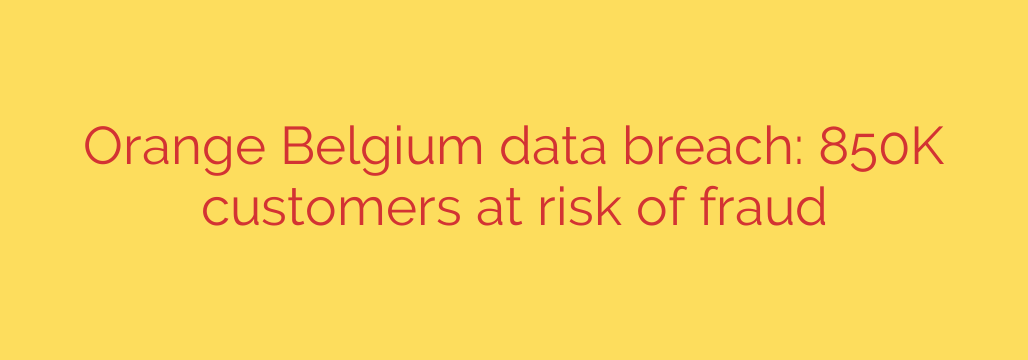
Major Data Breach at Orange Belgium Partner Exposes 850,000 Customer Details
A significant cybersecurity incident has impacted hundreds of thousands of mobile customers in Belgium after a third-party supplier for Orange Belgium was compromised. The breach has exposed the personal data of approximately 850,000 individuals, creating a serious risk of phishing attacks and identity fraud for those affected.
The security failure did not occur within Orange Belgium’s primary systems but originated from a key partner, Effortel. This company manages the technical platform for several Mobile Virtual Network Operators (MVNOs) that use the Orange network.
Who Is Affected by This Security Incident?
This data breach specifically targets customers of Orange Belgium’s MVNO partners. The vast majority of the individuals impacted are customers of:
- Mobile Vikings
- JIM Mobile
It is crucial to understand that direct Orange Belgium customers are not believed to be affected by this particular incident. The breach is contained within the systems of the third-party provider that serves the brands listed above.
What Specific Information Was Exposed?
Attackers gained unauthorized access to a sensitive database containing a range of personal customer information. While the investigation is ongoing, the compromised data is confirmed to include:
- Full Names
- Mailing Addresses
- Email Addresses
- Mobile Phone Numbers
- Belgian National Registry Numbers (rijksregisternummer)
The inclusion of the national registry number is particularly alarming, as this identifier is used for a wide variety of official and administrative purposes in Belgium, heightening the risk of sophisticated identity theft.
Fortunately, Orange Belgium has clarified that more sensitive financial information was not compromised. No bank account details, credit card numbers, passwords, or data related to call and internet usage were exposed in the breach.
The Real Dangers: Phishing and Identity Fraud Risks
With this combination of data, criminals can launch highly convincing and targeted scams. The primary threat to affected customers is phishing and smishing (phishing via SMS).
Scammers can use your name, address, and phone number to create fraudulent emails or text messages that appear to be from legitimate organizations like your bank, a government agency, or even Orange itself. These messages are designed to trick you into revealing more sensitive information, such as passwords or financial details, or to click on malicious links that install malware on your device.
Because the attackers also have national registry numbers, they may attempt more advanced forms of identity fraud.
Actionable Steps: How to Protect Yourself Now
If you are a customer of Mobile Vikings or JIM Mobile, it is essential to take immediate precautionary measures to protect your identity and accounts.
Be Extremely Vigilant: Scrutinize every email, text message, and phone call you receive. Be suspicious of any unsolicited communication that asks for personal information or urges you to take immediate action.
Verify the Sender: Before clicking any links, check the sender’s email address or phone number. Scammers often use addresses that are slightly different from official ones. If in doubt, contact the organization directly through their official website or phone number.
Never Share Sensitive Information: Remember that legitimate companies like Orange or your bank will never ask you to provide your password, full credit card number, or PIN via email or SMS.
Beware of “Urgent” Requests: Phishing attacks often create a false sense of urgency, claiming your account will be suspended or you will face a penalty if you don’t act now. Treat these messages with extreme caution.
Strengthen Your Passwords: While passwords were not part of this breach, it’s a good security practice to ensure you are using strong, unique passwords for all your important online accounts. Enable two-factor authentication (2FA) wherever possible for an added layer of security.
Orange Belgium has reported the incident to the appropriate authorities, including the Belgian Data Protection Authority, and is in the process of directly notifying all affected customers. In the meantime, staying alert and practicing strong digital hygiene is the best defense against potential fraud.
Source: https://go.theregister.com/feed/www.theregister.com/2025/08/21/orange_belgium_breach/








